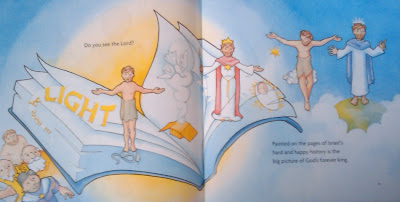Review: The Big Picture Story Bible
 I have been introduced to the best children’s Bible I’ve ever come across. The Big Picture Story Bible by David Helm with illustrations by Gail Schoonmaker is fantastic.
I have been introduced to the best children’s Bible I’ve ever come across. The Big Picture Story Bible by David Helm with illustrations by Gail Schoonmaker is fantastic.
Most children’s bibles are cringeworthy offerings. At best they are a loose collection of the exciting bits of the biblical narrative. At worst they are bibliotainment pieces using insipid and cliched devices dipping a toe into a shallow view of a vague God.
This Story Bible is not like that. It is a age-appropriate application of a robust biblical theology. Or, in the words on the back “a big book, about a big God, who keeps a big promise!”Just look at how it interacts with some key points of biblical theology:
- Creation: “God gave Adam and Eve good words to obey… You see, God was teaching Adam and Eve that he was their king, that people were to obey God’s word” (Page 33)
- Fall: “God punished them because they disobeyed God’s word, which was meant to rule over his place and his people… Did you know that some good news came on this sad day too?… God promised that one day someone would come and crush Satan’s power over people… But that day was a long way off.” (Pages 47-49)
- Covenant: “God made a big promise… God told Abraham to go to a new place, because God was going to make a new people, so that God’s blessing would spread to all people.” (Pages 68-70)
- Israel: “…God’s promise kept growing… After four hundred years in Egypt, God’s people had grown into a great nation named Israel…” (Page 107) “God did keep his promise to Abraham! He did make him into a great nation… God gave this great nation his good word” (Page 132)
- David: “David’s belief in God’s promise was big. David’s trust in God’s Word was strong” (Page 160) “God’s forever king would come from the family of David.” (Page 216)
- Jesus: “God was going to end his many years of silence. God was going to keep his promise of a forever king.” (Page 239)
- Crucifixion: “Jesus knew his time had come. Soon he would be king! ” (Page 360) “On a small hill outside the city of Jerusalem, Jesus was nailed to a cross, and died.” (Page 373) “Wasn’t Jesus God’s forever king? WIll God ever rescue his people from sin? Will we ever havr our place with him? Will God ever bring again his blessings on all peoples of the earth?” (Pages 378-380)
- Eschatology: “God’s forever people will one day live in God’s forever place under God’s forever rule.” (Page 450)
The culmination is Part 23 – “God’s promise is explained” – where we read “Jesus opened up God’s holy book… In it were many word pictures that proved he must die to pay the penalty for sin.. In it we many picture that promised he would rise again.” (Pages 400-406) “Painted on the pages of Israel’s hard and happy history is the big picture of God’s forever king.” (Page 411)

Can you see the theme of God’s “good word” and “God’s promise” and “God’s forever king” running throughout the story, tying it together, engaging with the substance of Scripture, not just the stories as stories.
This book is not just great for kids! As an introduction for all ages to biblical theology and the guts of the gospel, it is great.






